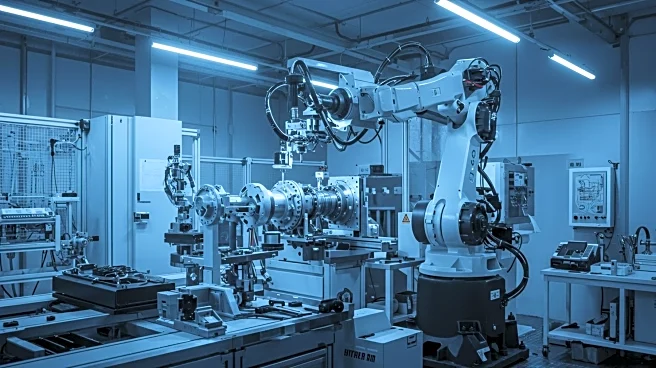What is the story about?
What's Happening?
The United States is experiencing a resurgence in manufacturing, driven by significant investments in industries such as semiconductors and automotives. This shift is partly due to efforts to reshore manufacturing jobs and reduce dependency on fragile global supply chains. However, the country faces a critical skills gap, with The Manufacturing Institute estimating a need to fill approximately four million manufacturing jobs by 2030, half of which may remain unfilled due to a lack of trained workers. To address this, regions like Buffalo are implementing collaborative workforce training models, such as the Northland Workforce Training Center (NWTC), which partners with local industry leaders to align training programs with real-world needs.
Why It's Important?
The manufacturing sector's growth is crucial for the U.S. economy, offering potential for job creation and economic development. However, the skills gap poses a significant challenge, potentially hindering the sector's ability to capitalize on new opportunities. Effective workforce training programs are essential to prepare a diverse labor force capable of sustaining industrial growth. By collaborating with industry and educational institutions, regions can create pathways to employment, ensuring that workers are equipped with relevant skills. This approach not only addresses immediate workforce needs but also contributes to long-term economic resilience and competitiveness.
What's Next?
As domestic manufacturing continues to expand, particularly in fast-growing sectors like semiconductors, there will be an increased demand for skilled workers. Investments in workforce training must match industry growth to ensure a steady supply of qualified personnel. The Buffalo Niagara region's collaborative model serves as a blueprint for other areas, emphasizing the importance of community-rooted training and partnerships between industry, education, and workforce organizations. These efforts are expected to drive industrial growth and help regions meet the challenges of the next decade.
Beyond the Headlines
The resurgence in manufacturing and the focus on workforce training highlight broader economic and social implications. Addressing the skills gap requires not only technical training but also support services that make education accessible to nontraditional candidates. Programs like NWTC offer transportation assistance, childcare, and career coaching, demonstrating the importance of holistic support in workforce development. This approach not only enhances graduation rates but also ensures that training programs contribute to economic impact and community well-being.
















